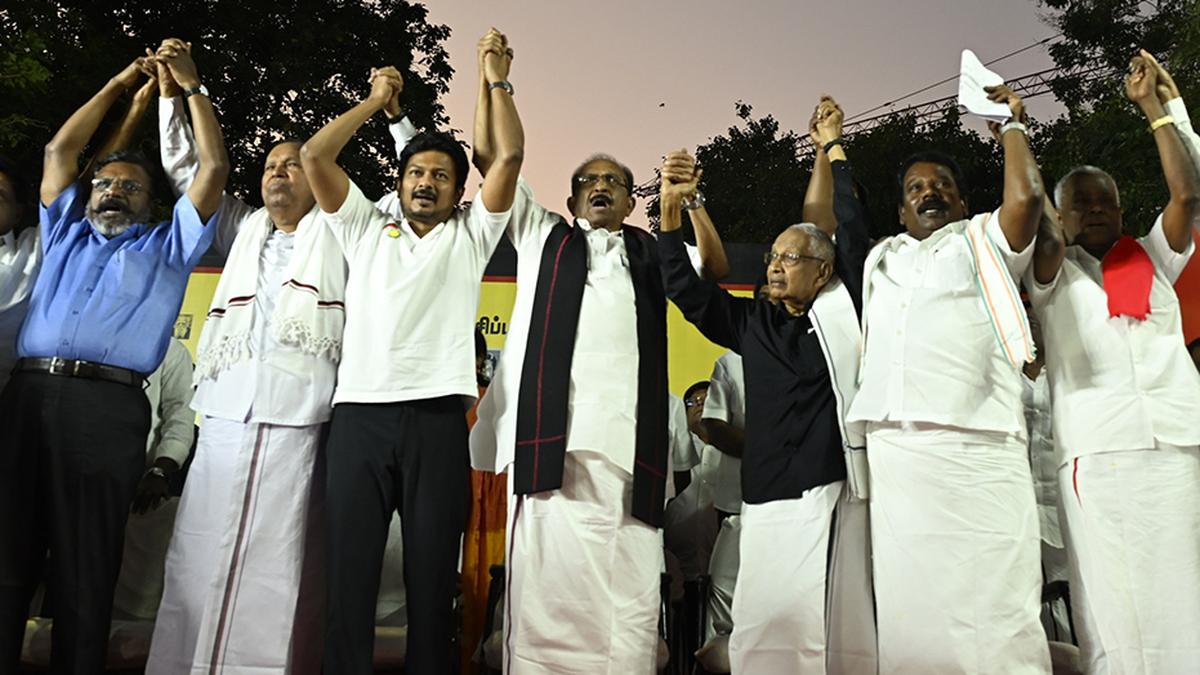Deputy Chief Minister Udhayanidhi Stalin and DMK’s allies party leaders protest against Union Education Minister Dharmendra Pradhan and the imposition of Hindi Language at the Collectorate in Chennai. File
| Photo Credit: The Hindu
The story so far: The Union Government has withheld ₹2,152 crore in funds due to Tamil Nadu under the Samagra Shiksha scheme for refusing to join the Prime Minister Schools for Rising India (PMSHRI) initiative. While T.N. is eager to participate in the PM SHRI scheme, it staunchly opposes the accompanying mandate to implement the National Education Policy (NEP) 2020.
One of the State’s core objections to the NEP is its insistence on adopting a three-language formula in schools. Union Education Minister Dharmendra Pradhan has rejected any concessions, insisting that T.N. must align “with the Constitution”. Chief Minister M.K. Stalin, questioning which provision of the Constitution justifies such mandates, has declared that the State will not submit to “blackmail” or abandon its historically adopted two-language policy.
What does the NEP 2020 state?
The NEP 2020 has retained the three-language formula, a concept first introduced in the NEP of 1968. The key difference, however, is that back then the NEP advocated for Hindi to be a compulsory language across the nation. Hindi-speaking States were required to teach Hindi, English, and a modern Indian language — preferably a south Indian language — while non-Hindi speaking States were expected to teach the local regional language, Hindi, and English. In contrast, NEP 2020 offers greater flexibility, technically not imposing any specific language on any State.
It states that “the three languages learned by children will be the choices of States, regions, and, of course, the students themselves, so long as at least two of the three languages are native to India.” This means, in addition to the State’s language, children would be required to learn at least one other Indian language — not necessarily Hindi. The policy also emphasises bilingual teaching, particularly in the home language/mother tongue and English. Conspicuously, it places significant emphasis on Sanskrit as an optional choice within the three-language formula.

Why is there opposition to this policy in T.N.?
Tamil Nadu has long resisted the ‘imposition of Hindi’. In 1937, when the C. Rajagopalachari (Rajaji) government in Madras proposed making Hindi a compulsory subject in secondary schools, the Justice Party fiercely opposed it. Two young men, Thalamuthu and Natarajan, who participated in the agitation, died and became icons in the anti-Hindi imposition movement. Rajaji eventually resigned, and the British government withdrew the order.
In 1965, as the deadline for adopting Hindi as the sole official language across India approached, the State witnessed violent protests that led to the deaths of at least 70 people in police shootings or self-immolations. The agitation resurfaced when Parliament adopted the Official Languages (Amendment) Act, 1967, and the Official Language Resolution, 1968, which mandated the teaching of Hindi as part of the three-language formula.

In January 1968, the Madras Assembly, led by the C.N. Annadurai-led first Dravida Munnetra Kazhagam (DMK) government, adopted a resolution calling for the scrapping of the three-language formula and the elimination of Hindi from the curriculum in T.N. schools. Since then, the State has steadfastly followed its two-language policy teaching Tamil and English. Major political parties, including the ruling DMK and the principal opposition All-India Anna Dravida Munnetra Kazhagam (AIADMK), have consistently opposed any efforts to alter this policy. In 2019, backlash led the Kasturirangan Committee to remove the mandatory Hindi learning clause from the draft NEP.
Why is the three-language policy seen as an attempt to impose Hindi?
Political parties and activists in T.N. view the three-language policy as a “smokescreen” and a “backdoor” attempt to impose Hindi. They argue that, in practice, the implementation of a three-language scheme would inevitably lead to the teaching of Hindi, given the limited resources for providing additional language teachers and learning materials.
Moreover, the Union Government and prominent BJP leaders have periodically advocated for the promotion of Hindi. In 2019, the Union Budget allocated ₹50 crore to support the appointment of Hindi teachers in non-Hindi speaking States. Critics contend the Centre’s actions do not match its rhetoric on promoting regional languages, as evidenced by the lack of efforts to hire adequate regional language teachers in Kendriya Vidyalayas or to ensure south Indian languages are taught in schools above the Vindhyas.
Mr. Pradhan has defended the withholding of funds to T.N., making it clear that adherence to the three-language policy is non-negotiable. He urged Mr. Stalin to “rise above political differences” and criticised the State for viewing the NEP 2020 with a “myopic vision”. In response, Mr. Stalin has accused Mr. Pradhan of attempting to “impose Hindi” under the guise of the NEP’s policy. Mr. Stalin has vowed that, as long as the DMK and he are around, Tamil and T.N.’s interests will not be compromised.
What is the way forward?
The only viable solution lies in constructive dialogue and a practical compromise between the Centre and the State on an issue like education, which was transferred from the State to the concurrent list during the Emergency. Notably, T.N., with its long-standing two-language policy, has consistently outperformed many other States in key metrics such as Gross Enrolment Ratio and reduced school dropout rates. Disagreements over teaching a third language should not be allowed to derail funding for Samagra Shiksha, a comprehensive programme for education.
Published – February 23, 2025 03:15 am IST




